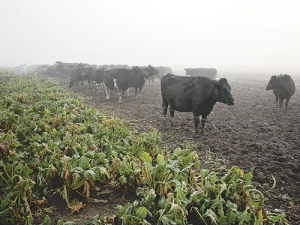State of the Dairy Nation 2024/25: DairyNZ Highlights Record Milk Production and Export Growth
DairyNZ's chief executive Campbell Parker says the 2024/25 dairy season reinforces the importance of the dairy sector to New Zealand.
 Vets are struggling with the emerging animal health issues of long-term fodder beet use on dairy farms.
Vets are struggling with the emerging animal health issues of long-term fodder beet use on dairy farms.
Farm veterinarians are struggling with the emerging animal health effects of long-term fodder beet use on dairy farms, says DairyNZ senior scientist Dawn Dalley.
This problem has attracted a $565,000 research grant from MPI’s Sustainable Farming Fund -- the largest single grant in the latest round.
Problems are showing up on farms that have sorted the initial transitioning issues, Dalley says.
“A lot of farms won’t have any problems for two or three or four years. But we’re seeing that the farms that seem to be getting these issues -- particularly phosphorus -- are those that have been feeding fodder beet for up to 10 years,” Dalley explains.
Cows are showing very low blood phosphorus levels despite supplementing with DCP or NCP, and giving low production despite having good body condition scores.
“On some of those farms the vets are struggling to understand what’s happening and animals aren’t responding to treatment that should be working,” she says. “So we’re trying to look and see what it is on those farms that could be causing that.
“The challenge we’ve got in our grass-based system is that phosphorus is a mineral we haven’t really had to think about previously, because pastures have a pretty good calcium-to-phosphorus ratio; it’s something new to our systems.”
The research will be a joint project of the South Island Dairy Development Centre (SIDDC), DairyNZ and AgResearch, PGG Wrightson and Plant&Food.
Dalley says the aim is to better understand the mineral interactions at play when fodder beet is included in the diet. The initial phase will include a national survey of farmers’ fodder beet usage.
“We know it’s being used differently in different regions,” she says.
“Farmers are very innovative and they’ve been trialling different things to make it work in their system. So we will seek to understand what their issues are, whether they’ve changed anything in their feeding or mineral supplementation, and what that’s meant in animal health.”
The researchers will analyse fodder beet’s mineral content, which is thought to differ between regions and cultivars. That aspect of the project will start on samples already held by Plant&Food and PGGW; these may already have been analysed for dry matter content but not minerals.
Dalley says the project will also link with the Southern Dairy Hub -- the new research and demonstration farm at Wallaceville, Southland. It is now setting up four separate farm systems to run for three years -- two using fodder beet and two using kale.
Dalley says some of the changes may be happening in calves even before birth so the Southern Dairy Hub project is a good chance to track calves born to dams fed on kale versus those fed on fodder beet.
“So we can take animals in two different directions and see what that means once they get into the herd.”
Recent weather events in the Bay of Plenty, Gisborne/Tairawhiti, and Canterbury have been declared a medium-scale adverse event.
DairyNZ's chief executive Campbell Parker says the 2024/25 dairy season reinforces the importance of the dairy sector to New Zealand.
A New Zealand agribusiness helping to turn a long-standing animal welfare and waste issue into a high-value protein stream has won the Australian dairy sector's top innovator award.
OPINION: A bumper season all around.
Dairy Women's Network (DWN) has announced that Taranaki dairy farmer Nicola Bryant will join its Trust Board as an Associate Trustee.
Rural Women New Zealand (RWNZ) says it welcomes the release of a new report into pay equity.

OPINION: A mate of yours truly reckons rural Manawatu families are the latest to suffer under what he calls the…
OPINION: If old Winston Peters thinks building trade relations with new nations, such as India, isn't a necessary investment in…